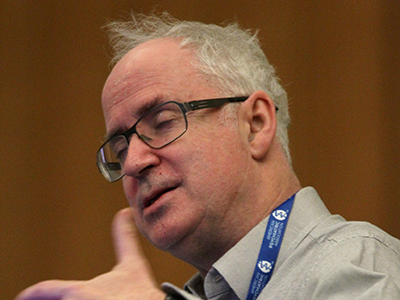Lessons Learned From Studying Mental Health Outcomes of U.S., U.K. Soldiers

The most traumatic national experience for Great Britain in the 20th century was World War I, whose centenary the nation is now observing, said Sir Simon Wessely (pictured above), the Regius Professor of Psychiatry and co-director of the King’s Centre for Military Health Research at King’s College London, at APA’s Annual Meeting. A century later, the mental health legacy of that war continues today for troops of both the United Kingdom and the United States.
In fact, 2017 also marks the centenary of the birth of modern psychiatry, a birth midwifed by the treatment of soldiers devastated by combat in the trenches, said Wessely, who is also president of the Royal College of Psychiatrists. Charles Myers, M.D., of the Royal Medical Corps had published a description of what he termed “shell shock” two years earlier. For a while, traumatized soldiers were simply sent home, but by 1917, the army had lost so many men that another approach was needed. Myers instituted what today is known as “forward psychiatry.” Soldiers were to be treated close to the front, as soon as possible, and with an expectation of recovery.
The United States joined the war that same year, and the two countries have been military allies ever since. That alliance offered an unusual chance for cross-national research on mental health as they fought wars in Afghanistan and Iraq over the last 16 years.
“We have seen similar experiences of war but also some different outcomes,” said Wessely. For instance, U.S. troops had higher rates of posttraumatic stress disorder (PTSD) from baseline following deployment to Afghanistan and Iraq, while the British saw no increase from baseline. Rates of mild traumatic brain injury ran about 15 percent to 22 percent among American forces, but were just 3.6 percent among the British. At the same time, rates of mental problems rose among British troops if their tours of duty were extended without notice, while they were deployed in combat. The British also faced greater problems with alcohol misuse.
Screening returning troops to detect symptoms of mental illness is a “seductive idea,” said Wessely, yet little is known about its value. So he and his colleagues conducted the first randomized, controlled study of the effects of mental health screening. The screened group received immediate feedback about any problems, while the control group just got general mental health advice. The results were not so seductive.
“Screening made no significant difference in mental health outcomes,” said Wessely. “It didn’t get people better or even connect them with help.”
Apparently, soldiers thought interventions were likely to be ineffective, or thought they could manage on their own, or they simply lacked confidence in the health system.
If there is a lesson to be learned, it may be a return to Charles Myers’ dedication to recovery.
“Military psychiatry has made an enormous contribution to the field of mental health,” said Wessely, “but the mental health of armed forces follows the same principles that apply to everyone else—that is, a combination of biological, physical, and social factors that affect the individual.”
(Image: David Hathcox)
|
|
|
|
|


